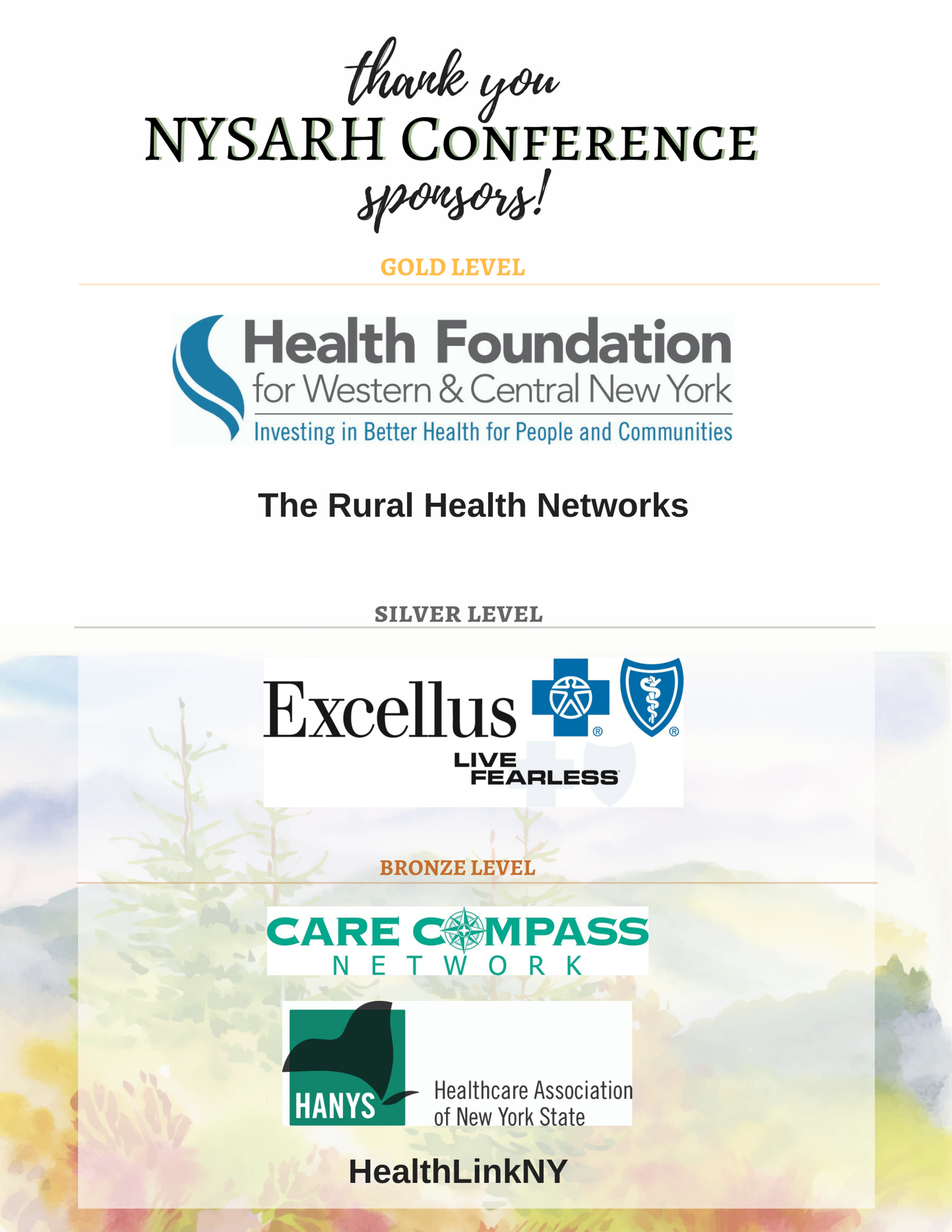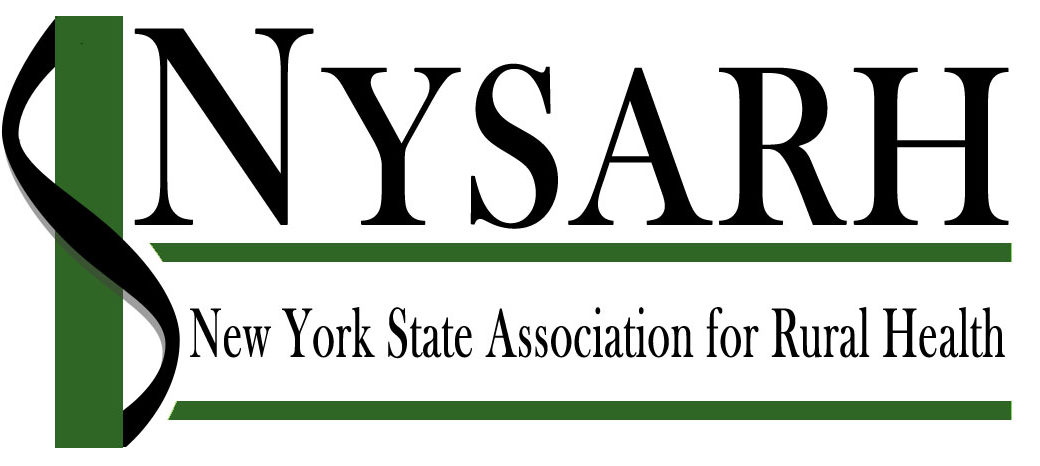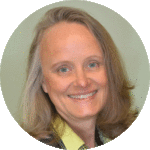 The 2018 Annual New York State Association for Rural Health (NYSARH) Conference is to take place September 27th-28th at Greek Peak Mountain Resort in Cortland, New York.
The 2018 Annual New York State Association for Rural Health (NYSARH) Conference is to take place September 27th-28th at Greek Peak Mountain Resort in Cortland, New York.
- Wednesday, the 26th, will include a pre-conference training workshop centered on promoting resilience with trauma-informed care.
- Thursday, the 27th, will include a talk by keynote speaker, Mark Fenton, general sessions, award ceremony, networking events, and a student poster session.
- Friday, the 28th, will include general sessions and a policy forum.
To register for the 2018 Annual NYSARH Conference, please click here.
Current detailed conference information is as follows (download it here):
PRE-CONFERENCE WORKSHOP – Wednesday, September 26th
SPONSORED BY SUNY Cortland Health Department and Research and Sponsored Programs Office
- PROMOTING RESILIENCE WITH TRAUMA-INFORMED CARE – 1:00-5:00p
A pre-conference training workshop centered on promoting resilience with trauma-informed care. This training is appropriate for professionals in all health and human service sectors and roles. CEUs/contact hours offered.
DAY ONE – Thursday, September 27th
- BREAKFAST and NETWORKING – 7:30-8:30a – SPONSORED BY Better Health for Northeast New York
- KEYNOTE SPEAKER: Mark Fenton – SPONSORED BY Seven Valleys Health Coalition
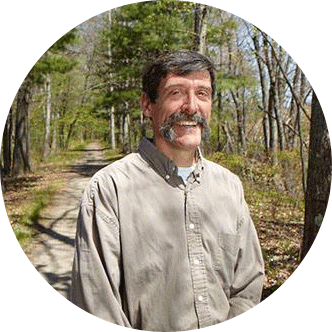 Mark Fenton is a national public health, planning, and transportation consultant, an adjunct associate professor at Tufts University’s Friedman School of Nutrition Science and Policy, and former host of the “America’s Walking” series on PBS television. His goal is to build communities that support a healthier, more physically active population, and more sustainable and enjoyable lifestyles. He works with organizations and communities around the country to build environments, policies, and programs that help to create places where more people walk, bicycle, and take transit more of the time. And it’s not just about healthier people. Done well, active community designs lead to economically, environmentally, and socially thriving cities, towns, and rural settings where people of all ages, abilities, and incomes lead long, vibrant lives
Mark Fenton is a national public health, planning, and transportation consultant, an adjunct associate professor at Tufts University’s Friedman School of Nutrition Science and Policy, and former host of the “America’s Walking” series on PBS television. His goal is to build communities that support a healthier, more physically active population, and more sustainable and enjoyable lifestyles. He works with organizations and communities around the country to build environments, policies, and programs that help to create places where more people walk, bicycle, and take transit more of the time. And it’s not just about healthier people. Done well, active community designs lead to economically, environmentally, and socially thriving cities, towns, and rural settings where people of all ages, abilities, and incomes lead long, vibrant lives
- NYS RURAL HEALTH UPDATE: Karen Madden, Director of Charles D. Cook Office of Rural Health NYSDOH
Karen will provide an update for conference attendees on the status of New York State health, specifically concerning rural health topics, policies, and recent pertinent news.
Luncheon – 12-1:15p – SPONSORED BY Hixny
Concurrent Session 1 –
- INTIMATE PARTNER VIOLENCE SCREENING FOR PRENATAL CARE PATIENTS: A QUALITY IMPROVEMENT INITIATIVE: Casey Harrison, Certified Nurse Midwife
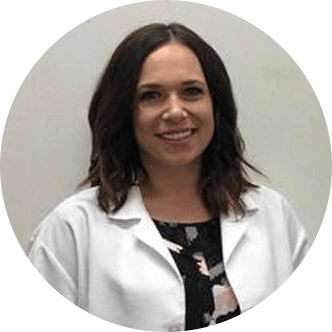 This session will review practices for successful screening, assessment, and response(s) to intimate partner violence (IPV) by looking at a multidisciplinary system-wide pilot study conducted at a FQHC in rural western NY. Implementation of IPV screening for the pregnant population with a multidisciplinary, collaborative, system-level approach led to increased disclosure and improved screening and referral rates. This approach provided real-time evaluation of the screening program for adaptation, as the program was implemented on a larger scale within the facility. IPV stakeholders will gain understanding regarding the importance of implementation of screening and referral using evidence-based practice guidelines. There will be a discussion on providers desire for more training, trauma-informed care measures, and collaboration with outreach agencies.
This session will review practices for successful screening, assessment, and response(s) to intimate partner violence (IPV) by looking at a multidisciplinary system-wide pilot study conducted at a FQHC in rural western NY. Implementation of IPV screening for the pregnant population with a multidisciplinary, collaborative, system-level approach led to increased disclosure and improved screening and referral rates. This approach provided real-time evaluation of the screening program for adaptation, as the program was implemented on a larger scale within the facility. IPV stakeholders will gain understanding regarding the importance of implementation of screening and referral using evidence-based practice guidelines. There will be a discussion on providers desire for more training, trauma-informed care measures, and collaboration with outreach agencies.
- LICENSED MIDWIVES IN HOMEBASED PRACTICES: Kate Finn, Licensed Midwife
Midwives are present in rural communities throughout New York. Licensed midwives work in clinics, private practices, hospitals, birth centers, and homes, providing well-woman care, as well as care for mother and baby throughout the childbearing cycle. As independent providers, midwives provide complete routine care and collaborate when medical opinions or care are indicated. This workshop will review the training and scope of practice of licensed midwives, and explain the quality framework and collaboration obligations for practice in rural settings. The role of the health care system in reducing barriers and developing systems to support collaboration will be reviewed.
- TRUSTED RESOURCES TO SUPPORT RURAL HEALTH: Erin Segar, Health Professions Coordinator for the National Network of Libraries of Medicine-Middle Atlantic Region
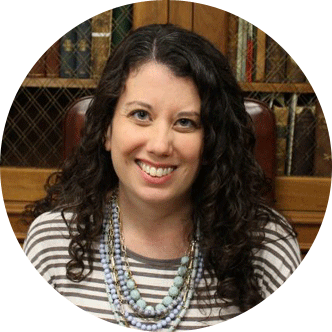 There are marked health disparities between individuals living in rural areas when compared with those in urban settings. Trusted health information and sources of local data and statistics offer valuable information necessary for public education and program planning. This session will equip those who serve rural communities with free, reliable sources of health information and data related to rural communities and the health issues faced by those who live there. The instructor, a skilled educator from the National Network of Libraries of Medicine- Middle Atlantic Region, will provide demonstrations of these databases to ensure that participants leave this session with the skills to locate the information they need. These live demonstrations, along with examples using relevant health conditions, will allow participants to walk away with the knowledge to immediately put these resources to use in the communities they serve.
There are marked health disparities between individuals living in rural areas when compared with those in urban settings. Trusted health information and sources of local data and statistics offer valuable information necessary for public education and program planning. This session will equip those who serve rural communities with free, reliable sources of health information and data related to rural communities and the health issues faced by those who live there. The instructor, a skilled educator from the National Network of Libraries of Medicine- Middle Atlantic Region, will provide demonstrations of these databases to ensure that participants leave this session with the skills to locate the information they need. These live demonstrations, along with examples using relevant health conditions, will allow participants to walk away with the knowledge to immediately put these resources to use in the communities they serve.
- TRAFFIC SAFETY AS A SOCIAL DETERMINANT OF HEALTH: Maureen Kozakiewicz, Highway Traffic Safety Representative
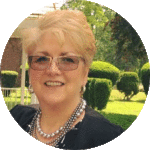 According to Healthy People 2020, health starts in our homes, schools, workplaces, neighborhoods, and communities. The goal of creating a social and physical environment that promotes good health for all is at the heart of traffic safety. Our roadways and sidewalks connect our communities and help provide access to resources of daily living and quality healthcare, education, and economic opportunities. Yet, in 2017, more than 40,000 people died in motor vehicle crashes alone. Learn how the NYS’s Governor’s Traffic Safety Committee is working with rural communities to save lives, prevent injuries, and reduce the economic costs of road traffic crashes. Join Ms. Maureen Kozakiewicz, NYS GTSC Representative, and a panel of GTSC rural grantees on how their efforts are impacting public safety and saving lives across NYS. Then learn how your community can join these efforts in the future. Panelist include: Tony D’Agostino NYS (Sheriff’s Association), ReBecca Smith (Public Health Projects Manager for Cortland Co. Health Dept.) and Helen Evans (Associate Director, Ardent Solutions, Inc).
According to Healthy People 2020, health starts in our homes, schools, workplaces, neighborhoods, and communities. The goal of creating a social and physical environment that promotes good health for all is at the heart of traffic safety. Our roadways and sidewalks connect our communities and help provide access to resources of daily living and quality healthcare, education, and economic opportunities. Yet, in 2017, more than 40,000 people died in motor vehicle crashes alone. Learn how the NYS’s Governor’s Traffic Safety Committee is working with rural communities to save lives, prevent injuries, and reduce the economic costs of road traffic crashes. Join Ms. Maureen Kozakiewicz, NYS GTSC Representative, and a panel of GTSC rural grantees on how their efforts are impacting public safety and saving lives across NYS. Then learn how your community can join these efforts in the future. Panelist include: Tony D’Agostino NYS (Sheriff’s Association), ReBecca Smith (Public Health Projects Manager for Cortland Co. Health Dept.) and Helen Evans (Associate Director, Ardent Solutions, Inc).
Concurrent Session 2 –
- SOCIAL DETERMINANT OF HEALTH: MEETING TRANSPORTATION NEEDS AND IT’S IMPACT: Bill Wagner, Director of Mobility Management of South Central New York
 The Rural Health Network of South Central New York implemented a Transportation Voucher program with funding through the local PPS, Care Compass Network. Medicaid individuals are provided transportation to meet health-related needs not covered by Medicaid transportation. As we enter in our second year of this program we will share our successes and challenges, how the program is being utilized, how it has been expanded and replicated, challenges we encountered and how they were addressed, what has been the short-term impact and what we hope to see in long-term impact.
The Rural Health Network of South Central New York implemented a Transportation Voucher program with funding through the local PPS, Care Compass Network. Medicaid individuals are provided transportation to meet health-related needs not covered by Medicaid transportation. As we enter in our second year of this program we will share our successes and challenges, how the program is being utilized, how it has been expanded and replicated, challenges we encountered and how they were addressed, what has been the short-term impact and what we hope to see in long-term impact.
- UTILIZING TELEMEDICINE TO REACH RURAL SPECIALTY CARE: Amy Vierhile, Pediatric Nurse Practitioner
 This presentation will focus on the infrastructure needed to develop and establish a telemedicine program with a special spotlight on program personnel development, follow-up needs, and providing optimal patient care.
This presentation will focus on the infrastructure needed to develop and establish a telemedicine program with a special spotlight on program personnel development, follow-up needs, and providing optimal patient care.
- HOUSING IS HEALTHCARE: Shari Weiss, Community Housing Manager for Catholic Charities of Cortland County
 Housing is a Social Determinant of Health. This workshop will present the unique variables associated with housing individuals with multiple issues (Homelessness, Mental Health, Substance Use, Unemployment, CPS involvement, etc.), current models of housing here in Cortland, the challenges and barriers faced by our participants, and some accomplishments that have positive results and engagement in physical and behavioral health care. Participants will learn about the models of housing and collaborative case management that may serve as examples for other rural communities.
Housing is a Social Determinant of Health. This workshop will present the unique variables associated with housing individuals with multiple issues (Homelessness, Mental Health, Substance Use, Unemployment, CPS involvement, etc.), current models of housing here in Cortland, the challenges and barriers faced by our participants, and some accomplishments that have positive results and engagement in physical and behavioral health care. Participants will learn about the models of housing and collaborative case management that may serve as examples for other rural communities.
Concurrent Session 3 –
- LEVERAGING LOCAL FOOD TO IMPROVE PATIENT HEALTH IN RURAL COMMUNITIES: Erin Summerlee, Director of Food and Health Network of South Central New York
 This workshop will focus on the South Central NY Fruit & Vegetable Prescription Program which brings together health care providers, local food retailers, and community educators to help prevent and manage chronic diet-related diseases in the adult Medicaid population. The FVRx program began as a pilot with two primary care offices in Broome County in 2017 and is expanding to 11 primary care offices and two hospitals in three counties for 2018. The FVRx program allows clinicians or community health workers to write prescriptions for fruits and vegetables that are accompanied by nutrition counseling, cooking education, chronic disease self-management classes, and other supports. FVRx packages comprehensive strategies to address social determinants of health, and offers relatively low-cost interventions to avoid future high-cost treatments for preventable diseases. The workshop will outline the process for clinical and community implementation, program outcomes, and include a discussion of investing in preventative nutrition through the value-based payment model.
This workshop will focus on the South Central NY Fruit & Vegetable Prescription Program which brings together health care providers, local food retailers, and community educators to help prevent and manage chronic diet-related diseases in the adult Medicaid population. The FVRx program began as a pilot with two primary care offices in Broome County in 2017 and is expanding to 11 primary care offices and two hospitals in three counties for 2018. The FVRx program allows clinicians or community health workers to write prescriptions for fruits and vegetables that are accompanied by nutrition counseling, cooking education, chronic disease self-management classes, and other supports. FVRx packages comprehensive strategies to address social determinants of health, and offers relatively low-cost interventions to avoid future high-cost treatments for preventable diseases. The workshop will outline the process for clinical and community implementation, program outcomes, and include a discussion of investing in preventative nutrition through the value-based payment model.
- COMMUNITY ENGAGEMENT FOR HEALTH IMPROVEMENT: Theresa Lahr, Project Coordinator for Seneca Towns Engaging People for Solutions and Gabe Telarico, Community Business Mentor

 This session focuses on community engagement emphasizing the social determinants of health. Seneca Towns Engaging People for Solutions (STEPS) will describe their community engagement work, including approach and activities implemented, and successes achieved in terms of resident involvement in health promotion activities, resident leadership, and changes in attitude toward health improvement.
This session focuses on community engagement emphasizing the social determinants of health. Seneca Towns Engaging People for Solutions (STEPS) will describe their community engagement work, including approach and activities implemented, and successes achieved in terms of resident involvement in health promotion activities, resident leadership, and changes in attitude toward health improvement.
- IMPACT OF STATE BUDGET ON RURAL COMMUNITIES: Casey Harrison, Certified Nurse Midwife
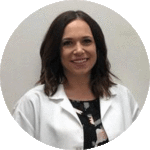 This session provides preliminary results of research investigating the economic impact of selected State-based funding cuts in the rural regions of New York State. The study includes funding cuts related to New York State rural Area Health Education Centers, Rural Hospitals, Rural Health Networks, and rural County Health Departments. The investigation used economic impact software, IMPLAN, to analyze direct, indirect, and multiplied effects on rural infrastructure and communities related to the State-funding cuts made to each of these entities between the 2016-2017 New York State fiscal year and the 2017-2018 New York State fiscal year. Initial results regarding economic impact at the county and legislative district levels suggest significant loss beyond the healthcare industry and negative impacts to rural community infrastructure.
This session provides preliminary results of research investigating the economic impact of selected State-based funding cuts in the rural regions of New York State. The study includes funding cuts related to New York State rural Area Health Education Centers, Rural Hospitals, Rural Health Networks, and rural County Health Departments. The investigation used economic impact software, IMPLAN, to analyze direct, indirect, and multiplied effects on rural infrastructure and communities related to the State-funding cuts made to each of these entities between the 2016-2017 New York State fiscal year and the 2017-2018 New York State fiscal year. Initial results regarding economic impact at the county and legislative district levels suggest significant loss beyond the healthcare industry and negative impacts to rural community infrastructure.
- STUDENT POSTER SESSION AND RECEPTION – 5-6:30p – SPONSORED BY HealtheConnections
DAY TWO – Friday, September 28th
- BREAKFAST and NETWORKING – 7:30-8:30a – SPONSORED BY Common Ground Health
- PLENARY SESSION:
THE OPIOID EPIDEMIC IN RURAL COMMUNITIES SPONSORED BY LeMoyne College
Beth Hurney – Prevention Network CNY (panel moderator)
Jim Scordo – Executive Director Credo Community Center
Amanda Stout – Chemical Dependency Program Director of Family Counseling Services
Judy Hopkins – Allegany County Legislator
Steve Kelly – President and CEO of Ellenville Regional Hospital
The U.S. is experiencing an epidemic of drug overdose deaths. In 2016, nearly 64,000 Americans died from a drug overdose, the overwhelming majority of which are opioids. At 174 people each day, this is more than the number of lives lost in car accidents or gun-related homicides. No corner of our country has gone untouched by the opioid crisis, but the impact on small towns in rural America has been particularly significant. In October 2017, the Centers for Disease Control and Prevention announced that the rates of drug overdose deaths are rising in rural areas, surpassing rates in urban areas. Join providers from across New York State as they describe how they are impacting opioid addiction through prevention, treatment and recovery services.
- POLICY FORUM – VALUE BASED PAYMENT SYSTEM
Carla Lisio – Center for Addictions (panel moderator)
Gary Weiskopf – Office of Mental Health
Lisa Hoeschele – Family Counseling Services of Cortland County
Patricia Lincourt – Office of Alcoholism and Substance Abuse Services
Dr. Judith A. Feld – Behavioral Health, MVP Health Care
Kathy Preston – Executive VP of the New York Health Plan Association
Robert Cawley – Sr. Project Manager of North Country BHCC and Director of Information Management of North Country Management Services
A stakeholder’s panel discussing the transition to Medicaid managed care and a value based payment reimbursement system. Panelists will discuss the State’s vision, the Managed Care Organization interpretation of that vision, the provider community response to prepare, and most importantly, what this transition will mean for NYS Medicaid members.
- CLOSING REMARKS – 12:30p
To register for the 2018 Annual NYSARH Conference, please click here.
